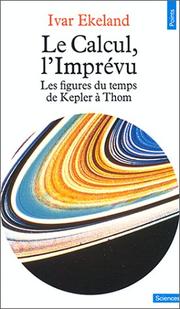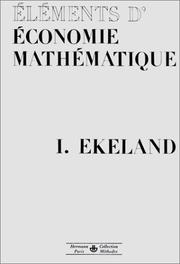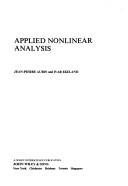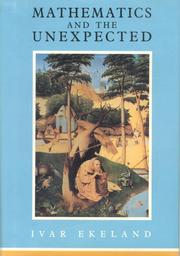| Listing 1 - 10 of 11 | << page >> |
Sort by
|

ISBN: 2020066831 9782020066839 2020095572 9782020095570 Year: 1987 Volume: 53 Publisher: Paris: Seuil,
Abstract | Keywords | Export | Availability | Bookmark
 Loading...
Loading...Choose an application
- Reference Manager
- EndNote
- RefWorks (Direct export to RefWorks)
Des progrès spectaculaires ont été accomplis récemment dans la description scientifique du temps et du changement. Rompant avec le morne déterminisme classique, ces idées nouvelles modifient déjà notre pratique de la science et notre conception du savoir. Elles brouillent les frontières du calculable et de l'imprévisible, du déterminé et de l'aléatoire, de l'ordre et du désordre.
Catastrophes (Mathematics) --- Catastrophes (Mathématiques) --- Differentiable mappings --- Manifolds (Mathematics) --- Singularities (Mathematics) --- Catastrophes (Mathematics). --- Espace et temps --- Systèmes dynamiques --- Catastrophes, Théorie des --- Mécanique céleste --- Dynamique différentiable --- Histoire --- Catastrophes (Mathématiques) --- Espace et temps. --- Systèmes dynamiques. --- Catastrophes, Théorie des. --- Dynamique différentiable. --- Histoire. --- Time measurements. --- Mechanics --- Temps --- Mécanique --- Mesure
Book
ISBN: 2020128772 9782020128773 Year: 1991 Publisher: Paris: Seuil,
Abstract | Keywords | Export | Availability | Bookmark
 Loading...
Loading...Choose an application
- Reference Manager
- EndNote
- RefWorks (Direct export to RefWorks)
Mathematical statistics --- Probabilities --- Statistique mathématique --- Probabilités --- Mathematics --- Statistical inference --- Statistics, Mathematical --- Statistics --- Sampling (Statistics) --- Probability --- Combinations --- Chance --- Least squares --- Risk --- Statistical methods --- Statistique mathématique --- Probabilités

ISBN: 270565853X 9782705658533 Year: 1979 Publisher: Paris: Hermann,
Abstract | Keywords | Export | Availability | Bookmark
 Loading...
Loading...Choose an application
- Reference Manager
- EndNote
- RefWorks (Direct export to RefWorks)
Economics, Mathematical --- Mathématiques économiques --- Economics --- Mathematical economics --- Econometrics --- Mathematics --- Methodology --- Economics, Mathematical. --- Mathématiques économiques

ISBN: 0226199940 9780226199948 Year: 2006 Publisher: Chicago (Ill.) University of Chicago press
Abstract | Keywords | Export | Availability | Bookmark
 Loading...
Loading...Choose an application
- Reference Manager
- EndNote
- RefWorks (Direct export to RefWorks)
Optimists believe this is the best of all possible worlds. And pessimists fear that might really be the case. But what 'is' the best of all possible worlds? How do we define it? Is it the world that operates the most efficiently? Or the one in which most people are comfortable and content? Questions such as these have preoccupied philosophers and theologians for ages, but there was a time, during the seventeenth and eighteenth centuries, when scientists and mathematicians felt they could provide the answer. This book is their story. Ivar Ekeland here takes the reader on a journey through scientific attempts to envision the best of all possible worlds. He begins with the French physicist Maupertuis, whose least action principle asserted that everything in nature occurs in the way that requires the least possible action. This idea, Ekeland shows, was a pivotal breakthrough in mathematics, because it was the first expression of the concept of 'optimization', or the creation of systems that are the most efficient or functional. Although the least action principle was later elaborated on and overshadowed by the theories of Leonhard Euler and Gottfried Leibniz, the concept of optimization that emerged from it is an important one that touches virtually every scientific discipline today. Tracing the profound impact of optimization and the unexpected ways in which it has influenced the study of mathematics, biology, economics, and even politics, Ekeland reveals throughout how the idea of optimization has driven some of our greatest intellectual breakthroughs. The result is a dazzling display of erudition& one that will be essential reading for popular-science buffs and historians of science alike.
Ethics --- Human behavior --- Logic, Symbolic and mathematical --- 517.1 --- Science --- Mathematics --- Ethics. --- Human behavior. --- Logic, Symbolic and mathematical. --- Mathematical analysis. --- Mathematics.
Book
Year: 1974 Publisher: Paris PUF
Abstract | Keywords | Export | Availability | Bookmark
 Loading...
Loading...Choose an application
- Reference Manager
- EndNote
- RefWorks (Direct export to RefWorks)
Book
ISBN: 0720428386 9780080875224 008087522X 1282754858 9781282754850 9786612754852 6612754850 9780444108982 044410898X 9780720428384 Year: 1976 Volume: 1 Publisher: Amsterdam: North-Holland,
Abstract | Keywords | Export | Availability | Bookmark
 Loading...
Loading...Choose an application
- Reference Manager
- EndNote
- RefWorks (Direct export to RefWorks)
Convex analysis and variational problems
Functional analysis --- Mathematical optimization --- Convex functions --- Calculus of variations --- Mathematical optimization. --- Convex functions. --- Calculus of variations. --- 517 --- 517 Analysis --- Analysis --- Optimisation mathématique --- Fonctions convexes --- Calcul des variations --- ELSEVIER-B EPUB-LIV-FT --- Isoperimetrical problems --- Variations, Calculus of --- Maxima and minima --- Functions, Convex --- Functions of real variables --- Optimization (Mathematics) --- Optimization techniques --- Optimization theory --- Systems optimization --- Mathematical analysis --- Operations research --- Simulation methods --- System analysis
Book
ISBN: 9782803637393 2803637391 Year: 2016 Volume: 6 Publisher: Bruxelles: Le Lombard,
Abstract | Keywords | Export | Availability | Bookmark
 Loading...
Loading...Choose an application
- Reference Manager
- EndNote
- RefWorks (Direct export to RefWorks)
Probabilités, absence de certitudes, impossibilité de prévoir ce qu'il va advenir, théorie du chaos… De tout temps, le hasard accompagne l'homme et ne cesse de le fasciner. Mais qu'en pense réellement un grand mathématicien ? Cet essai en bande dessinée nous explique de façon simple et ludique le hasard et ses mystères ainsi que les stratégies qui peuvent nous aider à mieux appréhender les prévisions, la chance et les jeux de hasard !
Hasard --- Chaos --- Probabilités --- Hasard - Bandes dessinées --- Chaos - Bandes dessinées --- Probabilités - Bandes dessinées --- mathématiques --- sciences physiques --- philosophie --- gnozeologie --- humanisme --- dialektika --- ontologie --- гносеологија --- epistemologie --- дијалектика --- епистемологија --- umanesimo --- bölcselet --- онтологија --- noetika --- filosofija --- filosofie --- filozofija --- filosofia --- filozofie --- philosophy --- filosofía --- филозофија --- φιλοσοφία --- filosoofia --- filozofi --- filozofia --- fealsúnacht --- filozófia --- философия --- Philosophie --- filosofi --- fysik --- fyzika --- fizika --- физика --- natuurkunde --- física --- füüsika --- physics --- fysica --- fizikë --- fysiikka --- φυσική --- physique --- fisica --- физика и сродни науки --- exakte Naturwissenschaften --- fyzikálne vedy --- физичке науке --- φυσικές επιστήμες --- xjenzi fiżiċi --- физически науки --- fizikalne vede --- füüsikateadused --- fyzikální vědy --- fysikaaliset tieteet --- физички науки --- nauki fizyczne --- naturvetenskap --- fiziniai mokslai --- shkenca fizike --- fysiske videnskaber --- eksaktās dabaszinātnes --- ciências físicas --- Physik --- natuurwetenschap --- fizică --- fizikai tudományok --- eolaíochtaí fisiceacha --- fizika i srodne znanosti --- ciencias físicas --- physical sciences --- scienze fisiche --- алгебра --- aritmetika --- logika --- géométrie --- algebra --- meetkunde --- geometrie --- логика --- геометрија --- gjeometri --- geomeetria --- γεωμετρία --- Geometrie --- geometry --- kombinatorika --- geometría --- geometria --- geometri --- geometrija --- matamaitic --- matemaatika --- математика --- matematica --- matematiikka --- matematik --- mathematics --- matematika --- μαθηματικά --- matematică --- wiskunde --- matemáticas --- matematyka --- matemātika --- Mathematik --- matematikë --- matemática --- mathématiques

ISBN: 0471059986 9780471059981 Year: 1984 Publisher: New York (N.Y.): Wiley,
Abstract | Keywords | Export | Availability | Bookmark
 Loading...
Loading...Choose an application
- Reference Manager
- EndNote
- RefWorks (Direct export to RefWorks)
Mathematical control systems --- Functional analysis --- Analyse fonctionnelle --- Nonlinear functional analysis --- 517.988 --- Nonlinear theories --- Nonlinear functional analysis and approximation methods --- Nonlinear functional analysis. --- 517.988 Nonlinear functional analysis and approximation methods --- Analyse convexe --- Analyse fonctionnelle non linéaire --- Programmation (mathématiques)

ISBN: 0226199894 Year: 1988 Publisher: Chicago (Ill.): University of Chicago press
Abstract | Keywords | Export | Availability | Bookmark
 Loading...
Loading...Choose an application
- Reference Manager
- EndNote
- RefWorks (Direct export to RefWorks)
Book
Year: 2003 Publisher: Cambridge, Mass. National Bureau of Economic Research
Abstract | Keywords | Export | Availability | Bookmark
 Loading...
Loading...Choose an application
- Reference Manager
- EndNote
- RefWorks (Direct export to RefWorks)
This paper considers the identification and estimation of hedonic models. We establish that in an additive version of the hedonic model, technology and preferences are generically identified up to affine transformations from data on demand and supply in a single hedonic market. For a very general parametric structure, preferences and technology are fully identified. This is true under a strong assumption of statistical independence of the error term. It is also true under the weaker assumption of mean independence of the error term. Much of the confusion in the empirical literature that claims that hedonic models estimated on data from a single market are fundamentally underidentified is based on linearizations that do not use all of the information in the model. The exact economic model that justifies widely used linear approximations has strange properties so the approximation is doubly poor. A semiparametric estimation method is proposed that is valid when a statistical independence assumption is valid. Alternatively, under the weaker condition of mean independence instrumental variables estimators can be applied to identify technology and preference parameters from a single market. They are justified by nonlinearities that are generic features of equilibrium in hedonic models.
| Listing 1 - 10 of 11 | << page >> |
Sort by
|

 Search
Search Feedback
Feedback About UniCat
About UniCat  Help
Help News
News